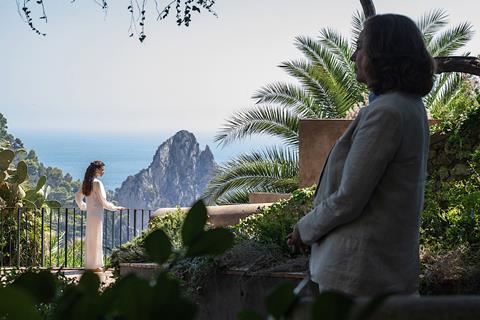Paolo Sorrentino returns to Naples for this problematic tale of the eponymous young beauty

Dir/scr: Paolo Sorrentino. Italy/France. 2024. 137mins.
Time was when European arthouse films were alternatives to more explicit fare for young men keen to catch a glimpse of breast. That time is not so far off in Parthenope, Italian auteur Paolo Sorrentino’s second film in a row to be set in his native city of Naples following the Oscar-nominated The Hand Of God. Lush, sensual, dripping with desire, this paean to Naples’ desperate beauty comes with a male gaze so intense and dazzling that one assumes no extra lighting was needed on set. That gaze is directed squarely at the film’s titular protagonist, a Neapolitan beauty born in 1950 and named after a legendary siren whose romantic death is associated with the foundation of the Greek city that preceded modern-day Naples.
Flashy audio-visual tableaux over narrative coherence
There is no faulting the radiant performance of Celeste Dalla Porta in her feature debut. It’s the objectification of her character that’s the issue – plus Sorrentino’s trick, here indulged even more flagrantly than in The Great Beauty, of privileging flashy audio-visual tableaux over narrative coherence. Enigmatic but sexy, independent-minded but available even to a louche and lewd ageing wreck of a bishop, Parthenope could be a metaphor for a city which seduces without ever giving up its soul, or she could be the incarnation of a shameless male fantasy. Audiences, which will be large in Italy and could be numerous elsewhere too, will make their own minds up while admiring the good-looking package – because for all its old-fashioned attitudes, Parthenope is nothing if not cinematic.
A 1950 prologue serves mostly to deliver that foundation myth – one only Neapolitans and a few others will pick up on – as Parthenope’s mother gives birth to her in the sea where her mermaid namesake met her end. Soon enough Parthenope is eighteen, sexy but smart, breezing through her university exams despite spending hardly a second of screen time studying anything except John Cheever short stories.
Parthenope appears to live in a castle by the sea with her distracted parents and a flock of servants – yet she and her melancholy brother Raimondo (Daniele Rienzo), with whom she has a more than sisterly rapport, are bizarrely short of cash. Somehow they cobble together the money to get the ferry to Capri together with Parthenope’s lovelorn suitor Sandrino (Dario Aita), where she runs into an alcoholic writer who turns out to be none other than American novelist John Cheever, played by Gary Oldman as a philosophical lush even further down the road than the disgraced MI6 boss he plays in TV series Slow Horses. (It must be the gin talking when he spouts guff like “Beauty is like war – it opens doors.”)
This extended Capri sequence, which ends in tragedy, at least captures some of the insouciant, provocative hormonal intensity of late adolescence. It’s on Parthenope’s return to Naples that the film begins to slide backwards off its Vespa. In between notching up further dazzlingly effortless academic honours, Parthenope meets a tenebrous acting coach (Isabella Ferrari) who wears a black lattice mask to cover up her botched plastic surgery, and a bitter ageing diva called Greta Cool (Luisa Ranieri) who, tempted back to her native city by a fat appearance fee, launches into a bitter diatribe against Naples and its penchant for “always blaming others for its problems”.
But it’s when Parthenope throws herself in quick succession at a smooth Camorra boss (a sequence that allows her to indulge in some ghetto tourism in one of the city’s toughest districts) and a sordid cardinal that we begin to lose any sense of her as a character with agency. A scene set in the cathedral of Naples in which she gives herself to the scuzzy prelate who presides over the thrice-annual liquefaction of the blood of the city’s patron saint, San Gennaro, will no doubt generate a few column inches in the Italian press. It is not immorality or sacrilege that’s the problem here, but the way Parthenope has, by this point, become simply a vehicle for a salacious vision, a scandalous sexy Madonna draped in great jewel-encrusted ecclesiastical chains.
Sorrentino’s last, the often movingly autobiographical The Hand Of God, felt real. For all its deliciously decadent interiors, romantic moonlit nights on Capri and eminently compilable pop, jazz and classical soundtrack, Parthenope feels like a circus act. It’s one that ends with the miraculous vision of a blue bus of Napoli soccer supporters celebrating their teams’ third Serie A title, hoving into view like the ocean liner in Fellini’s Amarcord. That’s not a spoiler – because, not for the first time in the movie, it has little or nothing to do with anything that came before.
Production companies: The Apartment, a Fremantle Group Pathe Films, Piper Film, Numero 10, Fremantle, Saint Laurent Productions, A24
International sales: Pathe
Producers: Lorenzo Mieli, Anthony Vaccarello, Paolo Sorrentino, Ardavan Safaee
Production design: Carmine Guarrino
Editing: Cristiano Trovaglioli
Cinematography: Daria D’Antonio
Music: Lele Marchitelli
Cast: Celeste Dalla Porta, Silvio Orlando, Dario Aita, Daniele Rienzo, Gary Oldman, Isabella Ferrari, Luisa Ranieri, Peppe Lanzetta, Stefania Sandrelli















![[L-R]: Amanda Villavieja, Laia Casanovas, Yasmina Praderas](https://d1nslcd7m2225b.cloudfront.net/Pictures/274x183/6/4/1/1471641_pxl_20251224_103354743_618426_crop.jpg)








